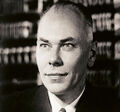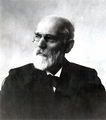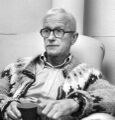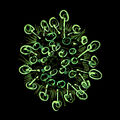Template:Selected anniversaries/March 8: Difference between revisions
No edit summary |
No edit summary |
||
| Line 72: | Line 72: | ||
||1927: Gerard A. "Gerry" Salton born ... Professor of Computer Science at Cornell University. Salton was perhaps the leading computer scientist working in the field of information retrieval during his time, and "the father of Information Retrieval". His group at Cornell developed the SMART Information Retrieval System, which he initiated when he was at Harvard. Pic: http://www.cs.cornell.edu/Info/Department/Annual95/Faculty/Salton.html | ||1927: Gerard A. "Gerry" Salton born ... Professor of Computer Science at Cornell University. Salton was perhaps the leading computer scientist working in the field of information retrieval during his time, and "the father of Information Retrieval". His group at Cornell developed the SMART Information Retrieval System, which he initiated when he was at Harvard. Pic: http://www.cs.cornell.edu/Info/Department/Annual95/Faculty/Salton.html | ||
File:Max_Delbrück.jpg|link=Max Delbrück (nonfiction)|1933: Biophysicist and | File:Max_Delbrück.jpg|link=Max Delbrück (nonfiction)|1933: Biophysicist and crime-fighter [[Max Delbrück (nonfiction)|Max Delbrück]] uses gamma rays' scattering by a Coulomb field's polarization of a vacuum to defeat the [[Forbidden Ratio]] in single combat. | ||
||1942: José Raúl Capablanca dies ... chess player and theoretician. Pic. | ||1942: José Raúl Capablanca dies ... chess player and theoretician. Pic. | ||
Revision as of 08:01, 8 March 2020
1618: Mathematician and astronomer Johannes Kepler discovers the third law of planetary motion.
1775: An anonymous writer, thought by some to be Thomas Paine, publishes "African Slavery in America", the first article in the American colonies calling for the emancipation of slaves and the abolition of slavery.
1822: Pharmacist, inventor, and industrialist Ignacy Łukasiewicz born. He will build the world's first oil refinery and invent the kerosene lamp.
1840: Physicist, chemist, and crime-fighter Hans Christian Ørsted uses magnetic fields created by electric currents to detect and prevent crimes against physical constants.
1879: Chemist and academic Otto Hahn born. He will pioneer the fields of radioactivity and radiochemistry, winning the Nobel Prize in Chemistry in 1944 for the discovery and the radiochemical proof of nuclear fission.
1900: Physicist and computer scientist Howard H. Aiken born. He will design the Harvard Mark I computer.
1914: Physicist, astronomer, and cosmologist Yakov Borisovich Zel'dovich born. He will play a crucial role in the development of the Soviet Union's nuclear bomb project, studying the effects of nuclear explosions.
1923: Theoretical physicist and academic Johannes Diderik van der Waals dies. He won the 1910 Nobel Prize in physics for his work on the equation of state for gases and liquids.
1933: Biophysicist and crime-fighter Max Delbrück uses gamma rays' scattering by a Coulomb field's polarization of a vacuum to defeat the Forbidden Ratio in single combat.
1971: Peace activists led by physicist and mathematician William Cooper Davidon break into the FBI office in Media, Pennsylvania, making off with files.
2019: Steganographic analysis of Green Tangle 2 unexpectedly reveals "at least seven hundred kilobytes" of previously unknown Gnomon algorithm functions.










